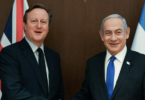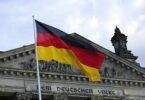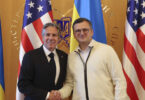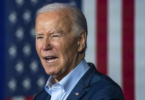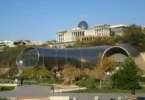F.P. Report
LONDON: Ambassador Neil Bush calls out Russia for brutal war in Ukraine that shows no distinction between military and civilian targets.
Thank you, Mr Chair.
Earlier this week, as countries across Europe marked the 77th anniversary of Victory in Europe Day, remembering the courageous efforts of those who fought in World War II, Russian hypersonic missiles were being fired at civilian locations in Odesa and the bodies of civilians seeking shelter were being pulled from the rubble of a school in Bilohorivka. I wish to pay respects to all the Ukrainian civilians who have died, and those who continue to suffer because of the Russian government’s unprovoked, unjustified and premeditated war. I want to focus today on two key elements – civilian infrastructure and cultural property.
A little over a year ago, Russia joined with others at the UN Security Council to unanimously adopt Resolution 2573, condemning deliberate attacks against civilians and civilian objects in situations of armed conflict and urging all parties to protect critical civilian infrastructure. This built on prior Resolutions 2286 and 2417. Yet, Russia has repeatedly and remorselessly used targeted and dumb munitions on civilian infrastructure in Ukraine, including nuclear facilities, government buildings, schools, and transportation, not to mention medical facilities and hospitals, which have unique protections under International Humanitarian Law.
Working alongside Ukraine, the international community will continue to expose the facts on the ground. The Moscow Mechanism report highlighted clear violations of International Humanitarian Law by Russian forces, including deliberate attacks on the Mariupol Maternity House and Children’s Hospital and the Mariupol Theatre, which was clearly marked as housing children. As of today, there have been over 200 verified attacks on Ukraine’s health facilities, according to the WHO. The Ukraine Ministry of Health reports that 21 hospitals have been destroyed. Stretched healthcare facilities in the East are having to respond to gender-based violence, including Conflict-Related Sexual Violence, and urgent sexual and reproductive health needs of women and girls. Russia’s actions have triggered a health crisis in Ukraine, and in the surrounding region, which has profound implications for global health.
Alongside schools and hospitals, contrary to its obligations under the 1954 Hague Convention, Russia is targeting cultural property. As verified by UNESCO, 127 cultural sites have been damaged or destroyed since the start of the war. This includes the Hryhorii Skovoroda National Literacy Memorial Museum in Kharkiv region, as mentioned by my Ukrainian colleague earlier. This is not collateral damage, as some in Russia would have us believe. Russia is deliberately waging a war with no distinction between military and civilian targets, with no regard for the Ukrainian people, their history or their culture, and using an information operation to undermine Ukrainian sovereignty, create false pretexts, and obscure the truth.
Mr Chair – we will not let war crimes go unaccounted for. Obligations under International Humanitarian Law are non-negotiable and perpetrators of war crimes in Ukraine will face justice. The International Criminal Court investigation is underway and the UK Government is working closely to identify and collate evidence of atrocities and crimes so that we, alongside international partners, can assist the investigation. The UK has also deployed a team of specialist war crimes experts to Poland to support the Ukrainian government in its investigations, and Attorney General Braverman has met with Prosecutor General Venediktova to discuss how British expertise can contribute to bringing war criminals to justice.
We will continue to do everything we can to ensure Ukraine succeeds. G7 partners are tightening the pressure on the Putin regime through severe sanctions. The UK is providing an overall package of humanitarian, economic and military support worth $2 billion, including a $272 million package for aid agencies on the ground providing vital medical and food supplies. We will continue to work with our Allies to ensure President Putin’s aggression beyond Ukraine is contained.
Mr Chair – since the end of the Second World War, the world has dedicated efforts to peace and stability and the principle that never again should people have to suffer such horrors. The OSCE stands for the principles of the Helsinki Final Act: respect for each other’s sovereignty, individuality, and territorial integrity; non use of force and respect for human rights and fundamental freedoms. These principles have been breached in the most profound way by Russia in its invasion of Ukraine. But these principles remain essential for European security. We will continue to stand up for those courageous civilians in Kramatorsk, Luhansk, Kherson, Donetsk, Mariupol and other cities who are fleeing intense fighting, struggling without food and water, and tragically losing their lives whilst taking shelter in schools and other buildings.
Ukrainians have shown the world over the course of the last two and a half months that no amount of force can overcome the dauntless strength and courage of a people determined to be free. However long it takes, we are determined to see Ukraine prevail with its sovereignty restored.


